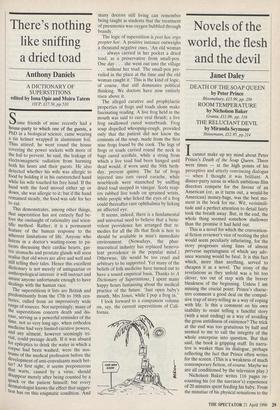There's nothing like sniffing a dried toad
Anthony Daniels
A DICTIONARY OF SUPERSTITIONS edited by Iona Opie and Moira Tatem
OUP, £17.50, pp.510
Some friends of mine recently had a house-party to which one of the guests, a PhD in a biological science, came wearing a tin helmet wrapped in aluminium foil. Thus attired, he went round the house covering the power sockets with more of the foil to prevent, he said, the leakage of electromagnetic radiation from harming both his hosts and their guests. He also detected whether his wife was allergic to food by holding it in his outstretched hand while his wife touched his free hand. If the hand with the food moved either up or down, she was allergic to it; but if the hand remained steady, the food was safe for her to eat.
This demonstrates, among other things, that superstition has not entirely fled be- fore the onslaught of rationality and scien- tific method. Rather, it is a permanent feature of the human response to the inherent limitations of life. Anyone who listens in a doctor's waiting-room to pa- tients discussing their cardiac hearts, gas- tric stomachs and prostate glands will soon realise that old wives are alive and well and still telling their tales. Hence this excellent dictionary is not merely of antiquarian or anthropological interest: it will instruct and amuse anyone unfortunate enough to have dealings with the human race. The superstitions it lists are British and Predominantly from the 17th to 19th cen- turies, culled from an impressively wide range of sources. Not surprisingly, many of the superstitions concern death and dis- ease, serving as a powerful reminder of the time, not so very long ago, when orthodox medicine had very limited curative powers, and any ailment, however seemingly tri- vial, could presage death. If it was absurd for epileptics to drink the water in which a corpse had been washed, were the nos- trums of the medical profession before the development of anti-convulsants much bet- ter? At first sight, it seems preposterous that warts, caused by a virus, should disappear merely after being counted by a quack or the patient himself; but every dermatologist knows the effect that sugges- tion has on this enigmatic condition. And many doctors still living can remember being taught as students that the treatment of pneumonia was oxygen bubbled through brandy.
The logic of superstition is post hoc ergo propter hoc. A positive instance outweighs a thousand negative ones. 'An old woman . . . always carried in her pocket a dried toad, as a preservative from small-pox. One day . . . she went out into the village . . . without her toad. The small-pox pre- vailed in the place at the time and the old woman caught it.' This is the kind of logic, of course, that still dominates political thinking. We doctors have now entirely risen above it.
The alleged curative and prophylactic properties of frogs and toads alone make fascinating reading. A live frog held in the mouth was said to cure oral thrush; a live frog swallowed cured waterbrash. Frog soup dispelled whooping-cough, provided only that the patient did not know the contents of the soup, made from the first nine frogs found by the cook. The legs of frogs or toads carried round the neck in bags cured scrofula, while a string from which a live toad had been hanged until dead would, if worn until the 50th birth- day, prevent quinsy. The fat of frogs injected into ears cured earache, while nosebleeds were staunched by sniffing dried toad steeped in vinegar. Scots reap- ers rubbed live toads on sprained wrists, while people who licked the eyes of a frog could thereafter cure ophthalmia by licking an affected eye. It seems, indeed, there is a fundamental and universal need to believe that a bene- volent providence has arranged that re- medies for all the ills that flesh is heir to should be available in man's immediate environment. (Nowadays, the phar- maceutical industry has replaced benevo- lent providence in the popular mind.) Otherwise, life would be too cruel and arbitrary to be supported. Yet many of the beliefs of folk medicine have turned out to have a sound empirical basis. Thanks to A Dictionary of Superstitions, I spent many happy hours fantasising about the medical practice of the future. 'Just open baby's mouth, Mrs Jones, while I pop a frog in.' I look forward to a companion volume on, say, the current superstitions of Cali- fornia.


















































 Previous page
Previous page